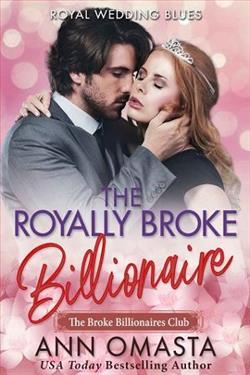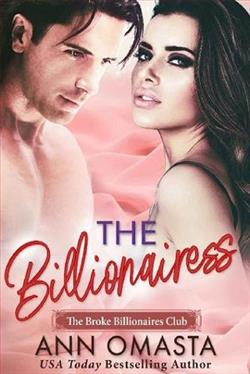Page 47 of Undercover with the Heiress
Phineas bunched his fingers into a fist and propped his chin against them as he studied the line of traffic outside. Thecarriage slowed, then stopped. Tall brick warehouses flanked each window, and in the distance, the Thames slapped against ships’ hulls. The clang of industry hummed through the air, a mix of engines huffing, whistles screaming, and the mournful bellow of a steamer. Phineas tapped her knee. ‘We’re here,’ he whispered, then flung the door open. ‘Ready for one last escapade, Mrs Babbage?’
‘After you,’ she said.
But he had already gone.
Chapter Nineteen
Phineas didn’t cast a look behind him once he hit the path. He couldn’t—one glimpse of Rosanna and the life about to be lost to him, and his resolve would flee. He was going to lose the shape of breakfast in a sunlit room and walls that changed their pattern every other week and plump lips and indulgent smiles. He ground his teeth in commitment.
He would set that free. Setherfree. Maybe make amends for every other failure in his life, too.
‘Are you certain you have the right address? This place looks as if it was abandoned decades ago.’ Rosanna tipped her chin upwards. A dot of light pinched her lovely upturned nose.
Phineas turned with the rest of them to look up at the old warehouse.
Paint peeled from the front door in thick slivers. The pintucked mortice between the red bricks, crisp and purposeful, spoke of past pride in construction. Dirt and soot caked over small rectangular panes on large windows with brick lintels, and a sunbeam snagged on a jagged corner of freshly broken glass. Slashes in the iron veranda over their heads let in stripsof morning, and while the holes and loose nails suggested desertion, the solid beams and decorative cornices spoke of care, an artistic eye, and purpose. Once, this place had mattered to someone.
Phineas jumped to bash the steel sign over the door, then took a few short steps back to avoid the shower of dust and soot that scattered over the path. Hamish, who was taller than him, took a handkerchief from his pocket to wipe at the bottom edges.
‘A. Is that a B? And another B… Iris… Did your father have a warehouse here?’
Hamish continued cleaning the sign until he had swept the bottom half of it and only a thin film of dust coated the top half. The gold had lost its sheen and mellowed, but the word itself was unmistakable. The building had once belonged to Iris’s father and had proudly displayed the nameAbberton—Merchant and Trader.
‘Papa used to talk about this place. Before he… well, before. I think this was his first warehouse, from when he started importing tiles from Italy. He said it was near the river and the bigger traders. He used to watch them. At times, he’d go down and talk to the foremen and the workers, to try and understand how he might become a little better than everyone else. As he grew, he leased space rather than purchase bigger warehouses. I didn’t realise he had kept this one. Although maybe he didn’t either.’
Hamish wrapped his arm around his wife’s shoulders. Iris took a slow breath and gave him a weak smile as she patted his arm.
‘What’s the plan?’ Hamish asked.
‘There is no plan because none of you should be here. Especially not you.’ Phineas glared at Rosanna. How could he keep her safe if she was so determined to put herself in harm’s way?
‘This whole mess directly concerns me. I absolutely should be here,’ she replied with a huff.
‘For once, could you not argue with me? Could you perhaps—’
‘Shh!’ Iris tapped his shoulder. ‘There are people inside. I can hear them.’
The four of them gathered beneath a window which stood slightly ajar. Phineas and Hamish crouched down, while the ladies in full skirts flanked either side of the glass. Rosanna tilted her body towards the sound, looking anywhere but at him. Good. Her anger would make today easier. If he baited and goaded her, as he’d done so often with others, would she voluntarily cast him aside? Everyone had left him—his mother, his stepfather, Imogen, Arley… Why not Rosanna, too?
Phineas tipped his ear towards the open window. A mélange of yelling and frustration teased the air, but nothing distinct enough to be understood. He pulled himself up. Four vague shapes were moving behind the soot-streaked glass, disappearing and reappearing in blurs. Phineas lifted the window frame a half inch. Shouts and criticisms squeezed through the small gap. The four of them leant closer in unison.
‘…ridiculous… gone too far.’
‘We agreed this… what we would do!’
‘People might get hurt.’
‘—said profits were up, that you… managing the business better… Abberton and his daughter. If we’d known…’
‘Money does not last forever! I thought you wanted a little extra, not to buy another townhouse for a new mistress!’
Rosanna grasped her skirts, hoisted them up, and crouched between him and Hamish. Iris joined them. They crowded over one another, elbows and knees jostling for space until the four of them slotted together and watched through the gap.
The four men of Argonauts Trading—Mr Collins, the horse-racing enthusiast; Mr Vincent, the philanderer; Mr Sanders, thefastidious bookkeeper; and Lord Richard, the failed investor of the exchange—circled one another like angry street cats vying over a discarded bone. Wooden pallets and crates formed a wall behind them. The boxes looked as if they’d been sitting idle for an age, dappled with grey dust and with faded black stamps along the woodgrain.
Hamish peeked up over the sill. ‘What’s in all those boxes? Is it stock for the department store?’
Rosanna shook her head. ‘That stamp is for Thornfield and Co. They went out of business ten years ago. And women may do ridiculous things for fashion, but no woman is going to wear a dress that needs a crinoline any longer. Who do they think they are going to sell these things to?’















